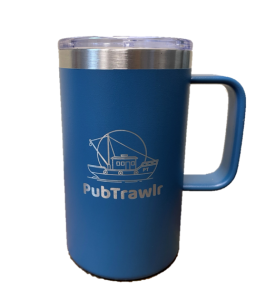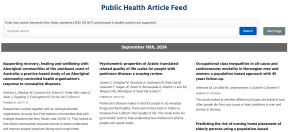
This Week in Public Health
Making public health accessible
Simplifies and highlights important public health research to make science accessible and engaging for everyone.
Stay effortlessly informed with AI-curated health insights—delivered to your inbox, tailored for your team, and distilled by PubTrawlr into bite-size clarity.
Health and science research is growing fast—too fast for most professionals to keep up. We fix that.
We simplify dense research into clear, bite-sized insights anyone can understand.
We condense the week’s most important findings into just a few focused minutes.
We prioritize peer-reviewed, bias-checked studies—so you get facts, not fluff.
Making science accessible across multiple domains

Making public health accessible
Simplifies and highlights important public health research to make science accessible and engaging for everyone.

Bridging research and knowledge
Bridges the gap between scientific research and everyday knowledge for the STEM fields and beyond.
With new studies published every minute, it's hard to know what’s credible—or even where to start. PubTrawlr makes science accessible, clear, and actionable for anyone who wants to stay truly informed.
Lightning-fast roundup of the week's must-read studies—delivered every Friday.
We strip out the acronyms so you can act, teach, or brief today.
Ask follow-up questions on any paper and get instant, cited answers.
Hand-picked by PhD-level editors—no sponsored content, ever.
Swap insights with 4K+ peers; crowd-source real-world solutions.
Request early access →
April 25, 2022 · 5 min read
We’ll have a lot to say about our TecBridge experience in the coming days; what we learned, what we tried about, and how we bounce back from disappointment. In the meanwhile, here’s an article about the event in the Times Leader. It’s pretty good, but I can’t help but wonder why the editor selected that […]

So we’ve launched the first of many feeds on current scientific topics over at This Week in Public Health. For a measly ten bucks a month, you can get plain language summaries and open-access links to THE BEST in public health research. Check out this terrible video I made on it below!
Read more →
Do you believe that science is a public good? Do you think everyone deserves access to the most up-to-date, accurate information possible to make informed decisions about their health, well-being, and happiness? At PubTrawlr, we’ve always stood by these principles, and now, we’re giving you a new way to show your support and commitment. Starting […]
Read more →
At PubTrawlr, we believe science should be accessible to everyone. When we first started, our mission was clear: to break down the barriers that keep people from engaging with scientific articles. These barriers often prevent crucial innovations from reaching the people who need them most. This is a huge loss for science and society. Every […]
Read more →
Hi there! I’m here to share the story of why I started PubTrawlr. It all began back in 2010 when I was a young graduate student studying community psychology. This field focuses on creating systemic changes to help improve health and wellness in our communities. One key aspect of this work is getting good ideas […]
Read more →Laranjeira C; Dixe MDA; Coelho A; Reigada C; Carneiro R; Querido A
Family caregivers are very important in helping sick people feel better, but they can feel really stressed and sad. Teaching caregivers how to help more can make things easier and better for everyone. In some places, people prefer to die at home, but in Portugal, most people die in hospitals, which might need to change.
Read articleShi X; Liu Y; Zhang R; Ren J; Guo S; Wang Z; Sun J
Monkeypox is a disease found in animals that can also spread to people. In 2022, it started appearing in places where it usually isn't found, which might be a problem for people. The first case in one part of China happened in June 2023, and this study looks at how the disease spread there to help prevent it.
Read article"Cuts my paper-reading time in half while boosting classroom discussions."
"Finally, a digest that my busy municipal team actually reads—and acts on."
"The AI explainer turned dense meta-analyses into clear policy briefs overnight."
New research. Changing policies. Emerging threats. Get everything distilled into weekly, plain-language insights — or risk falling behind.
Sample the digest & AI assistant with limited access.
Everything you need to lead with evidence — updated daily.
Secure payment by Stripe · Cancel anytime
Free = weekly highlight + limited AI queries.
Paid = full research feed, unlimited AI, toolkits, and full-text links when open access is available.
Cancel anytime in one click from your dashboard.
Not satisfied in the first 30 days? Email support@pubtrawlr.com for a full refund—no questions asked.
PhD-level epidemiologists and health-policy analysts, guided by our peer-review advisory board.
"Trawly" cites every answer, never trains on your private queries, and is continuously evaluated for bias and hallucinations.
Absolutely. Each summary includes APA-formatted citations and direct links so you can verify and reference the original study.
We follow GDPR and CCPA, encrypt subscriber data at rest, and never sell or share your email—ever.